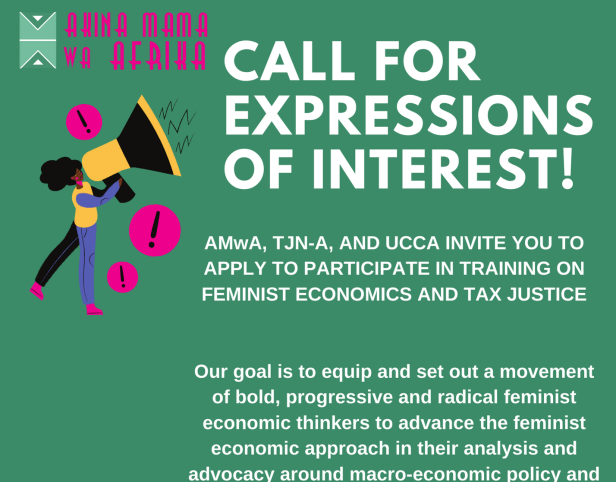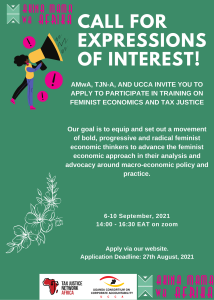
‘If someone hasn’t felt how it feels to eat last, to work more and to earn less, how do you expect them to support you…?’ Solome Nakaweesi Kimbugwe
INTRODUCTION
Akina Mama wa Afrika (AMwA) in collaboration with Tax Justice Network Africa (TJN-A) and the Uganda Consortium for Corporate Accountability (UCCA) invites applications from social and economic justice advocates including feminists, civil society, and women’s rights advocates who are interested in building their capacity in feminist analysis and advocacy around macro-economic policy and governance reforms. If you are already working on issues related to economic justice, gender justice, social justice, and climate justice, and are looking to strengthen your intellectual muscles and build individual expertise in feminist economic analysis; to join a movement of feminist economic thinkers and disruptors who are seeking to constructively engage and contribute to policy debates aimed at eliciting alternative narratives to the current dominant neoliberal capitalist ideologies; and to strengthen your ability to advocate and influence macro-economic policy and practice at the national, regional and global levels, then this is the training for you.
About the training
AMwA’s training on Feminist Economics and Tax Justice is a 5-day online training, whose overarching goal is to equip and set out a movement of bold and progressive radical feminist economic thinkers who can advance the feminist economic approach in their analysis and advocacy around macro-economic policy and practice. The training is also intended to catalyse a new thinking aimed at contributing to the process of creating an alternative narrative of “Building Back Radically” post COVID 19 – while reflecting and drawing lessons from the erring economic reforms of the 1980s. Through this training, social justice advocates including feminists, women’s rights advocates, socio-economic rights defenders, tax justice activists, and women environmentalists will be equipped with knowledge, information and skills to explore and develop alternative forms of feminist organizing and movement building to influence and disrupt macro-economic policy and decision making processes.
The training will take place from 6th – 10th September 2021 from 2:00-4:30 P.M. EAT.
Why apply for this training?
Feminist economics has become a central approach in the contemporary debate towards achieving gender equality and the full economic liberation of women and other minoritized groups. A feminist economic agenda interrogates power dynamics and peoples’ relative access to and use of wealth and resources[1]. A feminist economic approach also incorporates intersectionality and addresses the power dynamics between gender. It further acknowledges the need to address power relationships between nation states, ethnicities, ages, abilities, and other dimensions of diversity, and how they are interconnected with gender inequality and the economy[2].
Like in many other areas of life, neoliberalism[3] has strongly influenced the ways in which countries respond to pandemics, economic shocks, environmental disasters, – and their resultant effects on economies and life in general. This influence has majorly been driven by institutions like the International Monetary Fund (IMF) and the World Bank, which have been at the centre of promoting neoliberal ideals in development. With the outbreak of COVID 19, these institutions, like the IMF rushed to extend support to poor countries to respond to the economic effects of the pandemic. This support, which came in the form of loans, came along with conditions such as requirements to adopt austerity measures[4], among others.
As COVID-19 continues to spread in Africa, there are growing concerns that the situation of those disproportionately affected i.e. women and other marginalized groups, may worsen, owing to their individual vulnerabilities[5] and the ways in which the pandemic has overwhelmed social and economic systems and structures[6]. COVID 19 has exposed the toxic effects of a system that has for far too long dominated every aspect of our societies. Neoliberalism[7], as an economic ideology of capitalism, has depleted our public services, turned our healthcare into profit-driven businesses, hoarded profits at the expense of undervalued and underpaid workers, and aggravated inequalities between people and countries[8].
AMwA believes that changing this status quo requires a radical rethink, as it is already feared that unless the world works towards “Building Back Radically and Transformatively”, Africa’s most vulnerable countries and communities will be left behind in “Building Back Better” post COVID 19 under the same systems and structures that have brought us to where we are now. This training, which is grounded in feminist theory and praxis will serve as a space for revolutionizing the push back against corporate driven, neoliberal-capitalist and patriarchal systems and structures that underpin current pervasive economic models.
Overall Goal of the training
To equip and set out a movement of bold and progressive radical feminist economic thinkers who can advance the feminist economic approach in their analysis and advocacy around macro-economic policy and practice.
Objectives of the training
- To unpack the approaches to feminist economic analysis to strengthen the intellectual muscles of social justice advocates to reflect, reimagine, challenge, and pushback corporate driven macro-economic policy systems, such as fiscal policies on taxation, budget allocation and debt management.
- To build individual expertise of social justice advocates who can generate and advance feminist economic policy alternatives and effectively challenge and push back corporate demands centred around patriarchal, and neoliberal capitalist ideologies; and advocate for the centring of the needs of women and other minoritized groups in policy and governance reforms.
- To constructively engage and contribute to a phase of policy debates for the advancement of feminist economic ideologies in plans, strategies and actions to build back better post COVID 19, beyond merely participating in macro-economic policy debates already dominated by those who own large capital.
Methodology
AMwA will draw on its pool of Faculty for experts in feminist economics and advocacy to deliver the training. The training will be done online via zoom. Faculty will deliver modules that are relevant and responsive to online engagements. The training will be conducted primarily in English.
Requirements
A device (smartphone, tablet or computer) that can access internet and has provisions for audio and visual functions. AMwA will provide participants with a modest allowance to cover data costs.
Who is our target?
25 social justice activists including feminists, women’s rights advocates, socio-economic rights defenders, tax justice activists, and women environmentalists will be chosen for this training. Participants must be able and willing to dedicate 4 to 8 hours per week for classes and out of class assignments.
How to apply
Please fill in the application found at this link.
Application deadline: Friday, 27th August, 2021
Any applications received after this date will not be considered. Successful participants will be notified at least one week prior to the training program. We particularly encourage applications from women from diverse backgrounds (in terms of ethnicity, sexual orientation, disability, origin, religion, etc.)

[1] Why WHO needs a feminist economic agenda, https://www.thelancet.com/journals/lancet/article/PIIS0140-6736(20)30110-0/fulltext
[2] Crenshaw, Kimberle. “Mapping the Margins: Intersectionality, Identity Politics, and Violence against Women of Color.” Stanford Law Review, vol. 43, no. 6, 1991, pp. 1241–1299. JSTOR, www.jstor.org/stable/1229039. Accessed 3 Aug. 2021.
[3] A political approach that favours free-market capitalism, deregulation, and reduction in government spending.
[4] Over 80 per cent of IMF Covid-19 loans will push austerity on poor countries, https://reliefweb.int/report/world/over-80-cent-imf-covid-19-loans-will-push-austerity-poor-countries
[5] Oxfam International, Why the majority of the world’s poor are women, https://www.oxfam.org/en/why-majority-worlds-poor-are-women
[6] WHO concerned over COVID-19 impact on women, girls in Africa, https://www.afro.who.int/news/who-concerned-over-covid-19-impact-women-girls-africa
[7] A political approach that favors free-market capitalism, deregulation, and reduction in government spending.
[8] COVID 19: What has COVID 19 taught us about Neoliberalism?, https://www.wilpf.org/covid-19-what-has-covid-19-taught-us-about-neoliberalism/

